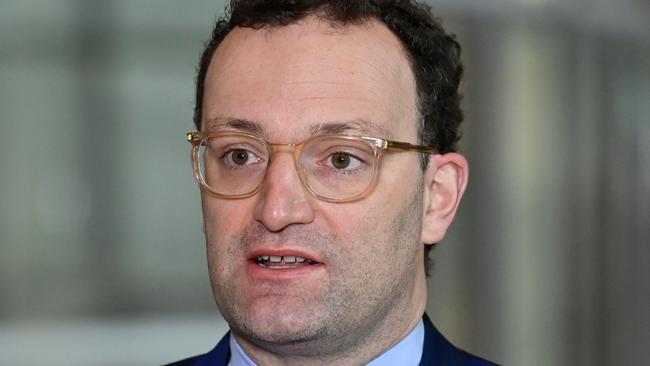EU scrambles to block export of coronavirus vaccines
The European Commission is poised to limit exports of coronavirus vaccines to Australia and other non-European countries so its citizens can be vaccinated first.

The European Commission is poised to limit exports of coronavirus vaccines to Australia and other non-European countries so its citizens can be vaccinated first.
The new rules, which were to be released overnight, are expected to slow the rate of export of any vaccines made or bottled in Europe to anywhere outside the continent, including Australia.
European politicians are under huge pressure to increase vaccination rates within the bloc after a slow start to their inoculation program exacerbated by supply issues.
German Health Minister Jens Spahn warned the German public of “at least another 10 weeks of shortages”.
The immediate ramifications of the new European red tape, designed to ensure European orders are prioritised, are unclear. But EU bureaucrats want to know if the big pharmaceutical companies are fulfilling non-EU orders at the expense of delaying any supplies to the 27-nation bloc.
Australia is due to receive 80,000 doses of its 10 million-dose order of the Pfizer-BioNtech vaccine, made in Puurs, Belgium, in the coming weeks.
Australia’s international supply of the Oxford-AstraZeneca vaccine has already been pared back from 3.8 million doses to 1.2 million in the coming weeks.
The AstraZeneca jabs are made in three factories in Britain and one in Seneffe, Belgium.
Foreign Minister Marise Payne has made representations to the World Health Organisation, and Health Minister Greg Hunt has spoken to British and European counterparts to try to shore up Australia’s orders.
Diplomatic channels have also stressed the close working trade relationships between Australia and Britain, and Australia and the EU, with free-trade deals poised to be completed with both regions sometime this year.
The European Commission’s new rules to hoard vaccine doses for the EU states were flagged following manufacturing issues that halved supply of the Pfizer and AstraZeneca vaccines in recent weeks.
European politicians have scrambled to secure supplies as vaccination programs slowed drastically, and in some regions stopped altogether. In France, vaccinations for 12 million people living in and around Paris have been halted, and other regions have had to push back their plans by six weeks.
In Madrid and in North Rhine Westphalia, the Spanish and German governments have stopped new inoculations, preferring to use dwindling supplies to provide the second jab to those who have had the first one. Barcelona and the wider Catalonia region are due to run out of supplies by this weekend.
Italy and Poland have threatened legal action to try to force the European manufacturers to divert stocks to their countries.
Earlier this week, Pfizer officials told The Weekend Australian “it is critical that governments do not impose export restrictions or other trade barriers that risk creating uncertainty and disrupting supply of vaccine to patients around the world’’.
The company added: “At this time, we are on track to deliver the first doses (to Australia) in February. However, we look forward to receiving further details on the EU proposal and assessing its impact.’’
Some of the uncertainty about Australia’s international supply stems from the country’s success in managing the virus. Australia’s perceived need for vaccines is much less than in Europe, where coronavirus death rates are still high and populations are under severe lockdown conditions.
The European issues stem from two unrelated problems.
Pfizer has had to halt production at its factory in Puurs for several weeks to increase its manufacturing output. At the same time, European officials have accused AstraZeneca of fulfilling its 100 million British order ahead of the Europeans’ contract for 400 million doses, providing British patients with jabs not only from its UK plants in Wrexham and Oxford, but from the Seneffe factory in Belgium and another in The Netherlands.




To join the conversation, please log in. Don't have an account? Register
Join the conversation, you are commenting as Logout